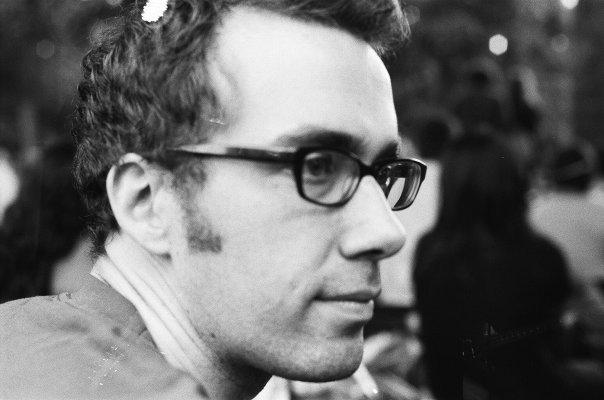Off the Cuff: Greg Walters ’03, Russian journalist, Bonnaroo rocker, former Review Editor-in-Chief and creator of “Off the Cuff”
April 6, 2014
Greg Walters, a political journalist-turned Brooklyn-based musician, gave a talk on Tuesday about breaking into international journalism. Walters, who was also the editor-in-chief of the Oberlin Review in 2003 and founder of Off The Cuff sat down with the Review on Wednesday to talk about Russian revolutions, the Moscow rock scene, and his transition into journalism.
Can you talk about how you got started at The Moscow Times?
I got super lucky, in that I got a stipend to go to Russia directly after Oberlin. The Russian Department gave me [a large enough stipend] that I could get an internship at The Moscow Times for nine months immediately after college. Which was kind of amazing, because it took the pressure off of me just picking up and going to Russia and trying to make it as a journalist with absolutely no support, and it meant that The Moscow Times didn’t have to pay me when I first got there, which was good for them. One thing kind of turned into another and I applied for a job at The Moscow Times after that stipend had run out, and I got it. [After that] I shuffled around to a bunch of different Russian news organizations and covered a bunch of random stuff: energy politics, revolution in Ukraine and Kyrgyzstan, war on Georgia… then I got burnt out and came home, and now I live in Brooklyn and, relatively speaking, take it easy.
What were the highlights of that experience?
Probably too many. The most interesting things for me were really dealing with the revolution scenario that’s on the ground, because that’s not something that I’d ever experienced in any other context of regular life. There’s a really crazy feeling when the government stops functioning all of a sudden. We don’t normally appreciate how well organized and protected we are in day-to-day life — protected by a police force that’s going to stop somebody from just looting a store, for example. When that falls away you suddenly notice it. It was an interesting lesson in what real anarchy looks like. For example, in Kyrgyzstan it all happened really fast. The crowd got together after fraudulent elections and overthrew the government really fast. All of a sudden there’s no government, and everyone decides that they’re going to go nuts. So there’s looting of one of the main downtown stores; this massive wash of people comes in, takes everything they can get their hands on, and leaves. Later I was taking a cab though downtown Kyrgyzstan and some guy tried to hail the cab, and the cab didn’t stop because I was in it. So that guy just kicks a huge dent in the side of the car as it drives past… and what are we going to do about it? So that was a really interesting experience.
Did you have any musical projects while in Russia?
Yeah. One of them was called the Nervous Wrecks, and it was a combination of two foreign journalists and two Moscow street musicians that we bumped into. It was a wild bunch. That band was kind of playing punk rock. They have this one really awesome club in Moscow with a packed house every Friday night no matter what’s happening, and three bands every night. It was a really fun receptive audience that we were playing for, and we weren’t necessarily really taking it that seriously. You could get away with a lot of stuff that maybe an American audience wouldn’t let you do: Like you could get up there and play a Pixies cover that no one in the audience had heard before. Like, “I love this song, “Where Is My Mind!” Is great song!”
If you could only tell your friends one story about your time in Russia, what would you tell them?
This didn’t actually happen to me, but when I first showed up at The Moscow Times, a great friend of mine and a really great reporter was getting sued by a mobster. His name was Semion Mogilevich. He’s on the FBI’s Top Ten Most Wanted list, literally.
Shit.
Yeah, this guy is no joke. He’s on there for: fraud by wire, RICO conspiracy, mail fraud, money laundering conspiracy, money laundering, aiding and abetting, securities fraud, filing false registration with the SEC, etc. etc. His Wikipedia page says he’s been involved with car bombings and other types of assassinations, and he was suing my really good friend and colleague because she had written an investigative piece about him. He wasn’t contesting that any of the details were false, at least what I remember. He was suing her for calling him a mobster, which you’re not allowed to do in print. He’s never actually been convicted, but I don’t even know if you should even be writing about this guy.
Anything else?
One time I was wandering around Moscow late one night kind of drunk with a friend, and the gatekeeper to Lenin’s tomb offered to let us in after hours at 3:30 in the morning for 20 bucks. We decided not to go in… I couldn’t image what would get thrown at you if you got busted breaking into Lenin’s tomb at three in the morning. So in the end we didn’t do it. But I think it’s kind of telling of how the way things work over there.
What was it like to be thrown out of the Oberlin bubble and directly into Moscow?
I actually really enjoyed it. I think maybe because part of what was appealing to me about being a journalist is the fact that most people tend to live in a cloistered, small-bubble type world, and one of the fun things about being a journalist is that you get to be a tourist through these different types of worlds. In fact that’s kind of your job description: In fact you’re getting paid to go in and investigate somebody’s world and somebody’s world view, figure out how they see the world and then try to explain it to people. For whatever reason I get a big kick out of that. Moving somewhere as foreign and incredibly non-liberal as Russia was a very big shock. I’ve very often heard people say things about race and gender that would get you in a lot of trouble at Oberlin. It doesn’t get much more different than going from Oberlin, Ohio to Moscow, Russia.
After having all of this crazy life experience, is there any advice that you’d give your past college self?
One really basic thing that nobody really told me when I was here, but which I’ve discovered the hard way after getting out, is that it’s totally fine if you don’t know what you want to do after college for a career, but if you want to be able to make better than minimum wage, the way to do that is to have some kind of skill. It can be anything. In my case it’s writing and editing texts and understanding politics and business and finance, but it could be graphic design, or film editing, or anything that’ll pay you better than minimum wage. If you can do that you can live just fine, and pursue some kind of other artistic passion/project that you feel like going after. But if you graduate with a great education but no actual skills, you’re not actually that employable.
Your band, Tiny Victories, played Bonnaroo last year now you guys are coming out with a new album — so you’re clearly doing pretty well. Can you talk about the switch you made from journalism to music? How did that even happen?
I sort of decided a couple years back to take a break from the Russia politics thing and do music before I got so old that that would be ridiculous. It’s always been on my back burner and I finally just decided to really make it a priority. And in some ways, moving from being a Russian journalist to a musician in New York was an even bigger shock than being an Oberlin student and moving to Russia. The truth is that I’ve worked harder on the music thing harder than I’ve worked at anything else in my life, because it’ll just expand and take as much energy as you can throw at it. The hard part about doing music is not playing music itself, it’s dealing with all the other logistical problems and issues that you have to get around to put the rest of your life in order such that you have the time and the space and the ability to spend your time making new music. If there’s something that you can do as a day job that doesn’t take up all of your time you’ll have plenty of time to play music. The key was having all of these other skills to keep the lights on, which allowed me to invest in instruments and a practice space and transportation and stuff that you need, and still spend time producing our last record. That’s the secret ingredient to making it fly.


























